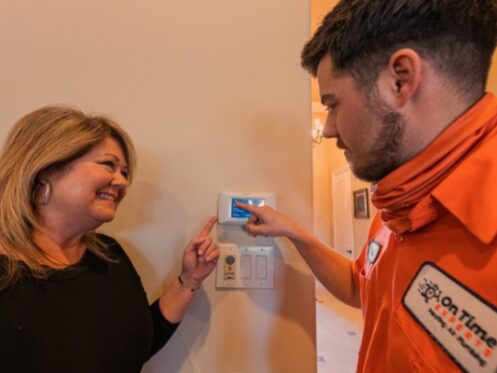One of the most impactful features of modern home comfort is the addition of smart home technology. This relatively new way of using connected devices to improve the functionality, convenience, and efficiency of your home has changed the way we interact with our heating, cooling, plumbing, air quality, and electrical systems. By connecting smart home technology in your home, you can maximize usability and get even more out of your home’s systems.
Save Water and Keep Your Lawn Beautiful With Smart Sprinklers
Smart sprinklers aren’t often at the top of homeowners’ list of must-have smart devices. But Anchor Text the convenience they add to your life is well worth considering. Not only can you set schedules and control your sprinklers from your phone, but many smart sprinkler systems can automatically detect the weather and adjust your schedule accordingly. You can also expect features that will adjust your watering times to reduce runoff and help the water soak in more efficiently.
While these features make it easier for you to control your system automatically, they ultimately work together to reduce water waste and save you money in the long run. Many systems are also certified by the EPA Watersense program, which allows you to get rebates on your utility bill.
Save Energy and Stay Comfortable With a Smart Thermostat
Smart thermostats are any thermostat that connects to WiFi. Now that they’ve been around for over a decade, there’s a little more history to look back on and determine their viability in the market. When it comes down to it, it’s clear to see that smart thermostats can be beneficial, even if it’s just for the energy savings alone. According to multiple studies, a smart thermostat saves the average American family $50 per year by using features like automatic shut-off when it detects there’s no one home. This number may be even higher in areas with more extreme temperatures.
If you’re considering installing a smart thermostat, it’s important to be aware that some older furnaces and air conditioning systems may not be compatible with smart thermostats. In these cases, you may be able to attach an adapter, but it could also mean hiring a professional to replace your HVAC system completely.
While this might mean higher cost upfront, many new HVAC systems have better energy efficiency in general, so a new system paired with a smart thermostat might be worth the installation cost for the long-term savings.
Streamline Your Home Security With Smart Locks
Smart Locks can get a bad rap, but when used safely and correctly, they can really improve the security of your home without sacrificing accessibility. Physical keys only maintain their security when they’re in your position. The moment they are misplaced, the high security that they offer goes down significantly.
Smart locks are more easily encrypted for safety, and access rights can be revoked and re-issued immediately from your phone. Additionally, many smart lock systems allow you to monitor the usage of keys, so you know which locks have experienced attempted opens and when.
Control Your Lighting Remotely With Smart Lightbulbs
Smart lightbulbs are more than just a gimmicky way to switch the lights off without getting up from the couch. It turns out that adding lightbulbs to your smart home system can actually increase energy efficiency and lower your electric bill. By creating schedules to turn lights on and off, you can ensure that you’re not wasting energy. More so than that, they have a very low upfront cost compared to other smart home upgrades and use more energy-efficient lightbulbs that last quite a bit longer.
In addition to increasing efficiency, you can use smart lightbulbs to control the temperature, color, and brightness of the light in your home. Check your lights from afar and make sure everything is turned off, or create schedules to match your regular work routine.
Stay Ahead of Maintenance With a Smart Water Heater
Regular maintenance is vital to maximizing the lifespan of your water heater, but many homeowners forget to have it inspected until an issue appears. And often, the problem sits for far too long before being detected. Installing a smart water heater can help you stay on top of repairs by automatically detecting issues and sending you alerts to schedule maintenance. You’ll save money in the long run by treating problems as they arise and getting the most functionality you can out of your water heater.
Smart systems are available for electric, natural gas, and liquid propane water heaters.
Stay Organized With a Smart Assistant
Smart assistants are one of the most common smart features available. Many American households have them accessible for regular use, and for good reason. Smart assistants like Amazon Alexa and Google Home can make phone calls and send text messages on your behalf, keep track of daily schedules, create to-do and grocery lists, and give you hands-free control over many of your daily tasks.
Perhaps one of the most useful is the ability to connect your smart assistant to many other smart features in your home, giving you the ability to do things like turn the AC on, cancel your sprinklers for the day, or start your morning coffee early, all with a simple voice command.
Reduce Food Waste With a Smart Refrigerator
Smart refrigerators come with a host of features, including the ability to watch TV, add items to your grocery list, and manage your calendar directly from the built-in touchscreen. However, with many other smart features giving you similar capabilities, these features aren’t the ones that really make the smart refrigerator shine.
The ability to reduce energy consumption and reduce food waste is really at the top of the list when it comes to smart refrigerator functionality. Many models allow you to see the inside of your fridge in real time, so you can avoid buying groceries you already have at home. Some even allow you to view the expiration date of everything in your fridge so you can plan what to use first and reduce food waste. Save on energy bills with automatic temperature adjustment and maintenance alerts, as well.
Use Smart Plugs to Make Older Appliances More Efficient
Replacing every item in your home with a smart appliance isn’t exactly cost-effective, which is where smart plugs come in. These small adapters, which cost between $8 and $40 each, allow you to upgrade any of your traditional appliances with basic smart features. Use them to schedule or automate when an item turns on and off, utilize voice commands with your smart assistant, and lower your electric bill.
Maximize Your Home’s Functionality with Smart Systems
With plenty of options for adding smart appliances to your home, the most important thing is that they make your life easier. Choose the ones that make sense for your routine and home life, and skip those that don’t fit your specific needs. By opting for smart systems that work for you, you can save yourself time and money and simplify your life in several areas.

